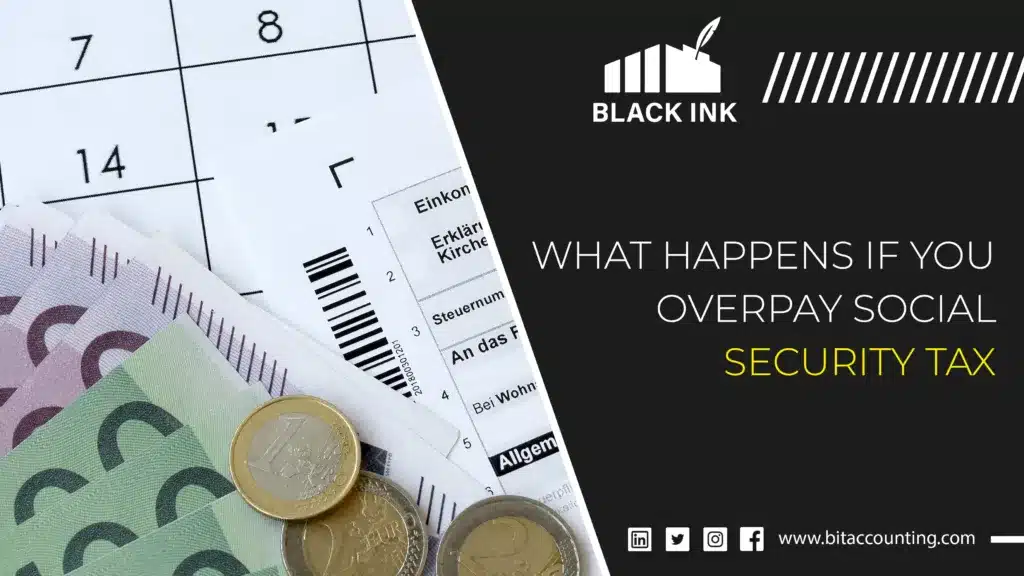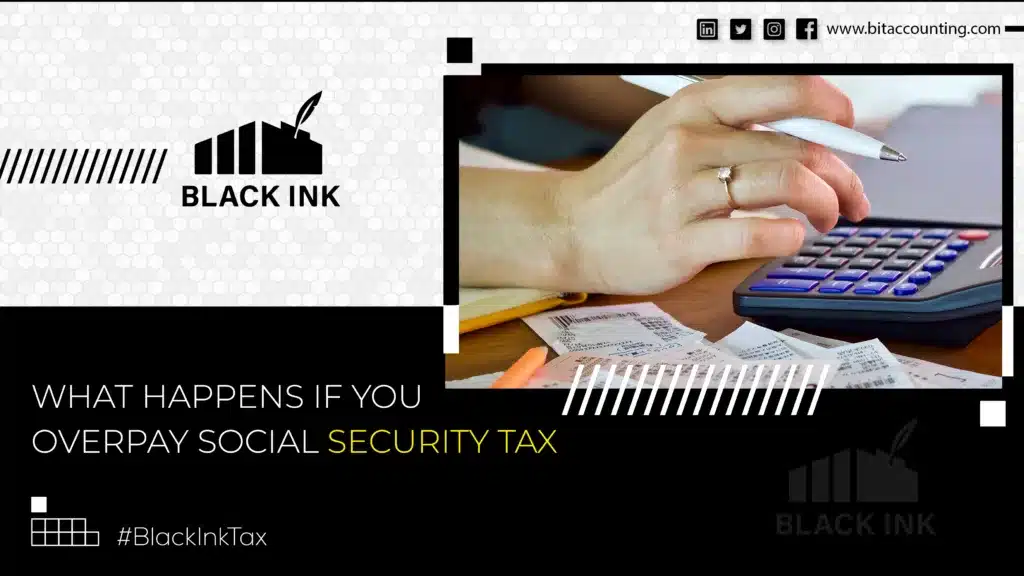
Table of Contents
What Happens If You Overpay Social Security Tax?
Taxing itself is something no one enjoys, if anything people try to avoid it (which you shouldn’t obviously, as you’ll be committing a felony) so it’s a pain, but while bearing this pain what happens if you overpay social security tax by accident? Don’t worry many individuals make this mistake, specially those who are new to paying taxes and sometimes even those who have been paying their taxes for quite a while, trust us even those individuals make blunders like these. We will tell you here what are the problems faced by it and how can you get your hard working earned money back, just sit back and read carefully.
What is Social Security Tax?
So, the main question rises what is Social Security Tax? It’s a necessary contribution which is made by the people working in the United States in order to support the broader safety for the Old-Age who are planning for retirement, survivors of the deceased, and Disabled Individuals also known as OASDI, which is the official name for Social Security Tax. Whenever you earn a wage, a small portion that is 6.2% for employees in 2025, is automatically withheld to fund this program, and your employer must be matching this amount, but if you are self-employed i.e. not working for anyone (being your own boss) then you have to pay both parts. Think of it as a long-term investment for your future, making sure that you are saving money when you stop working for any reason like Old-Age or any specific circumstances, in U.S there is a system made for individuals like you.
How to Pay Social Security Tax
Social Security Taxes are normally deducted from your paycheck. As discussed above, if you are self-employed, you’ll be paying both parts of your tax, as an employee and as an employer. It’s really important to understand this laws as by not following these you’ll be committing a felony that will trigger the IRS, so kindly don’t.
How Social Security Works
As discussed above, social security tax also known officially as OASDI, is solely for the Old, Disabled, and Survivors, these taxes make sure that you live a peaceful life when you are old or God forbid something unsettling happens with your life, this program is made by the U.S government and its to help its honorable tax paying citizens.
Calculating Social Security Taxes
Calculating this is important specially if you are self-employed, because you have to pay it yourself it won’t be deducted from your paychecks you get from your clients, but even if you are an employee, you still should know how much SS tax is being deducted that way, you’ll know you are not getting over-charged. In 2025, the Social Security Tax rate remains 6.2% for employees and employers as well, but for self-employed citizens the full payment will be 12.4% as 6.2% plus 6.2% from the employer side makes this subtotal. This tax applies to earnings up to the wage base limit, which is $176,100 for 2025.
Wages Subject to Taxation
Wages subject to Social Security tax include:
- Salaries and hourly wages
- Bonuses and commissions
- Overtime pays
- Certain outlying benefits
Wages Not Subject to Taxation
Not all earnings are subject to Social Security tax. Exemptions like:
- Reimbursements for business expenses
- Employer contributions to retirement plans
- Certain types of insurance benefits
What Forms Are Used to Pay Social Security Tax?
Typically, these three forms are used to pay social security tax and also for overpayment refund:
Form W-2
- This form is provided by your employer and details your annual wages and the taxes withheld, including Social Security taxes.
Form 843
- If you’ve overpaid Social Security taxes, Form 843 is used to request a refund from the IRS.
Form 1040
- This is the standard individual income tax return form. If you’ve overpaid Social Security taxes, you can claim a credit on this form.
Tax Overpayments
Tax overpayment can occur due to various reasons like admin errors, numerous employers, or most commonly miscalculations, to avoid such errors its really important to review your paychecks and regularly check your tax documents to see if anything is wrong.
How to Recover Excess Social Security Withholding
If you realized you overpaid the IRS or there was an error in your calculation after submission follow these three simple steps:
- Review Your W-2: Make sure the Social Security tax withheld aligns with the wage base limit.
- Claim a Credit: If you’ve had multiple employers, claim the excess on your Form 1040.
- Request a Refund: For overpayments from a single employer, request a refund directly. If denied, file Form 843 with the IRS.

Recovery of Excess Social Security and Tier 1 RRTA Withholding
When you were working, and there were multiple employers in that specific year or the earnings you made that year exceeded the wage limit you might have overpaid. In such cases you should:
- Multiple Employers: You can claim the excess as a credit on your Form 1040.
- Single Employer: Request a refund directly from your employer. If unsuccessful, file Form 843 with the IRS.
Similar procedure is applied if withholding is for Tier 1 Railroad Retirement Tax Act (RRTA) overpayments.
Recovery of Excess Tier 2 RRTA Withholding
- Excess Tier 2 RRTA tax withholding, applicable to railroad employees, can be reclaimed by filing Form 843 and attaching copies of all relevant Forms W-2.
Pros and Cons table for Social Security Tax
| Pros | Cons |
| Provides guaranteed income during retirement | Reduces your take-home pay each paycheck |
| Offers support for disabled individuals and surviving family members | You might pay more into the system than you eventually receive |
| Employers match your contribution, doubling what goes toward your benefits | Self-employed individuals must pay both employee and employer portions |
| Acts as a financial safety net in uncertain times | Benefits may be taxed based on your total retirement income |
How Much Tax Will Be Withheld From My Social Security Check?
Social Security benefits may be subject to federal income tax, depending on your combined income. It’s advisable to consult with a tax advisor to determine your specific situation, for advice visit BitAccounting to get a free consultation today!
Last Verdict
Overpaying your social security tax can be an unexpected hiccup, however it can be done right with the right knowledge and necessary actions to recover your hard-earned money. Always try to deal with such situation through a tax planning services, which will result in saving money and your precious time.
FAQs
Q1. Can I get a refund if I overpaid Social Security tax?
Yes, by claiming a credit on Form 1040 or filing Form 843.
Q2. What is the wage base limit for 2025?
$176,100.
Q3. How do I know if I’ve overpaid Social Security tax?
Review your W-2 forms and compare the withheld amount to the wage base limit.
Q4. Is there a time limit to claim a refund for overpaid Social Security tax?
Generally, you must file within three years from the date you filed your original return or two years from the date you paid the tax, whichever is later.
Q5. Do self-employed individuals have the same wage base limit?
Yes, the same wage base limit applies.
Q6. What if my employer refuses to refund the overpaid tax?
You can file Form 843 with the IRS to request a refund.
Q7. Are Social Security benefits taxable?
Depending on your income, up to 85% of your benefits may be taxable.
Q8. What is the difference between Tier 1 and Tier 2 RRTA taxes?
Tier 1 is equivalent to Social Security, while Tier 2 is a separate pension plan for railroad employees.
Q9. Can overpayments affect my future benefits?
No, overpayments do not impact your future Social Security benefits.
Q10. Where can I get assistance with overpaid Social Security taxes?
Consult with a tax professional.
GET FREE QUOTE FOR ALL OF OUR SERVICES
Black Ink will send you a free analysis of your current state and what would be the cost of managing either a separate accounting and bookkeeping services or a complete solution across New York, USA. Do get in touch and we will be happy to consult you with our bookkeeping services in NY, New York, USA.
